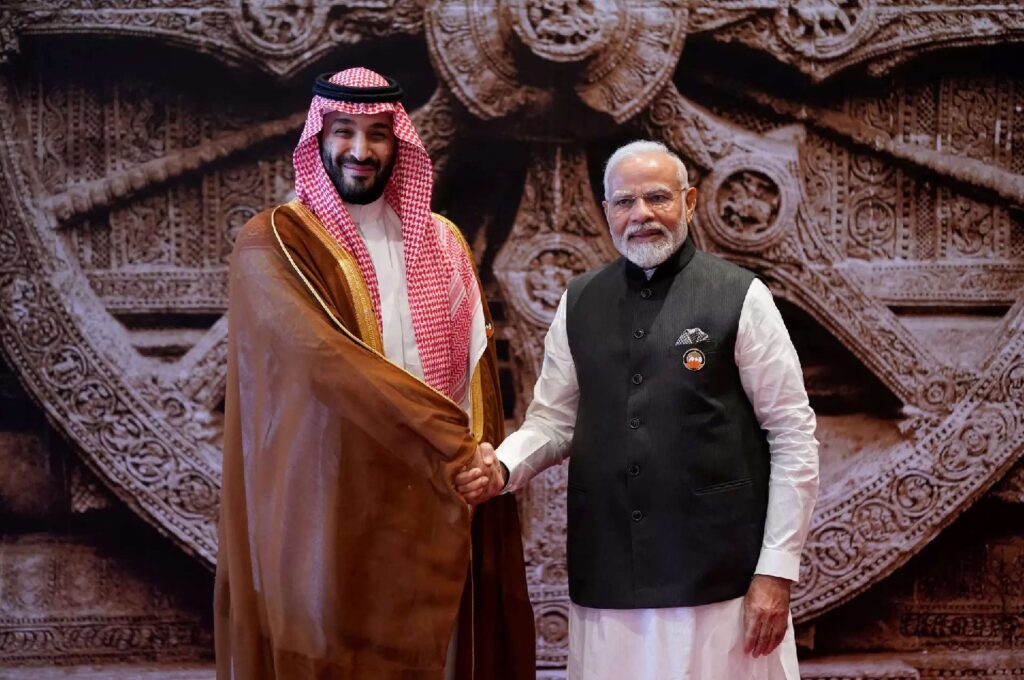
- The discussions focussed on enhancing connectivity between India and the Gulf nations encompassing improvements in ports, railways, roads, power grids, gas networks, and optical fibre infrastructure.
- Beyond economic ties, the statement underscored the depth of cooperation in the defence sector, with discussions revolving around the potential for joint development and production of defence equipment.
- On counterterrorism, both nations unequivocally rejected terrorism in all its forms and emphasized the importance of preventing access to weapons, including missiles and drones, for the purpose of conducting terrorist activities.
In the wake of the G20 Summit, where the ambitious India-Middle East-Europe Economic Corridor (IMEC) project took centre stage. India and Saudi Arabia have taken substantial strides in strengthening their partnership. This collaborative effort has culminated in the signing of eight pivotal agreements, encompassing critical sectors such as energy, digitalization, electronic manufacturing, finance, and security.
During an exclusive bilateral meeting held between Prime Minister Narendra Modi and Saudi Crown Prince and Prime Minister Mohammed bin Salman Bin Abdulaziz Al-Saud, immediately following the G20 Summit, Prime Minister Modi underscored the strategic importance of this partnership. He emphasized Saudi Arabia’s pivotal role as one of India’s foremost allies, highlighting the cooperation between two dynamic and rapidly growing economies as instrumental for regional peace and stability.
In response, Crown Prince Mohammed bin Salman expressed his enthusiasm for being in India and commended the country for successfully hosting the G20 Summit. He acknowledged the significant outcomes of the summit, which hold the potential to benefit both nations and the broader global community.
In a subsequent press briefing, officials provided in-depth insights into the eight agreements. Notably, they elaborated on the transformation of the hydrocarbon energy partnership into a comprehensive energy collaboration, encompassing renewables, petroleum, and strategic reserves. Additionally, they discussed the establishment of a joint task force to oversee $100 billion in Saudi investments, with half of this allocation directed towards a deferred refinery project on India’s western coast.
Enhancing connectivity between India and the Gulf nations emerged as another focal point of these discussions. This encompassed improvements in ports, railways, roads, power grids, gas networks, and optical fibre infrastructure. Of particular significance was the IMEC project, a multinational initiative aimed at connecting India to Europe through a rail and port network involving the United States, Saudi Arabia, India, the European Union, and the United Arab Emirates. It is regarded as a strategic response to China’s Belt-and-Road Initiative.
Apart from infrastructure, the agreements spanned various domains of cooperation, including anti-corruption initiatives, investment promotion, support for small and medium-sized enterprises, archives preservation, desalination, and renewable energy. Talks also explored the potential for trade conducted in local currencies and the expedited negotiations for a free trade agreement between India and the Gulf Cooperation Council, where Saudi Arabia plays a significant role.
Furthermore, over two dozen Memorandum of Understanding (MoUs) were sealed between Indian and Saudi Arabian companies, covering a wide spectrum of sectors, including information technology, agriculture, pharmaceuticals, petrochemicals, and human resources.
The joint statement underscored the magnitude of trade in the bilateral relationship, with both sides acknowledging substantial growth. In the fiscal year 2022-23, bilateral trade surged past the $52 billion mark, marking a remarkable growth rate exceeding 23%. India now occupies the position of Saudi Arabia’s second-largest trade partner, while Saudi Arabia ranks as India’s fourth-largest trade partner.
Beyond economic ties, the statement underscored the depth of cooperation in the defence sector, with discussions revolving around the potential for joint development and production of defence equipment.
On counterterrorism, both nations unequivocally rejected terrorism in all its forms and emphasized the importance of preventing access to weapons, including missiles and drones, for the purpose of conducting terrorist activities.
Lastly, the statement highlighted the shared goal of ensuring security and stability in Afghanistan. This involved the commitment to the formation of an inclusive government representing all segments of the Afghan population and the resolve to prevent Afghanistan from becoming a safe haven for terrorist and extremist groups.
India expressed its gratitude to Saudi Arabia for its support in evacuating Indian nationals and for facilitating the journeys of Indian Haj and Umrah pilgrims. President Droupadi Murmu hosted a banquet in honour of the Saudi Crown Prince, during which she recognized the substantial contribution of Indian expatriates in Saudi Arabia and the conducive environment provided for their growth.
In summary, this meeting between India and Saudi Arabia signifies a significant leap in strengthening their bilateral relations and underscores their joint commitment to addressing various regional and global challenges through cooperation on a global scale.
References:
- https://www.businesstoday.in/amp/g20-summit/story/saudi-arabia-and-india-sign-over-50-agreements-at-investment-forum-following-g20-summit-397945-2023-09-11
- https://www.arabnews.com/node/2371251/business-economy
- https://indianexpress.com/article/india/post-g20-india-and-saudi-arabia-build-on-corridor-strategic-ties-8935619/
- https://www.financialexpress.com/business/defence-fortifying-economic-bonds-highlights-from-the-india-saudi-investment-forum-3240119/lite/
